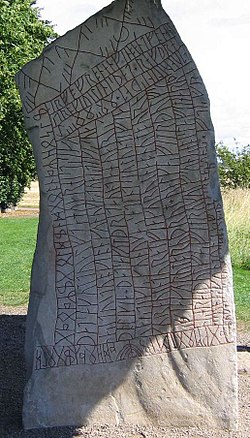Old Norse language
Appearance
| Old Norse | |
|---|---|
| Dǫnsk tunga ("Danish tongue") Norrœnt mál ("Norse speech") | |
| Native to | Scandinavia |
| Region | Nordic countries, Great Britain, Ireland, Isle of Man, Normandy, Newfoundland, the Volga and places in-between |
| Era | developed into the various North Germanic languages by the 14th century |
Indo-European
| |
Early forms | |
| Runic, later Latin (Old Norse alphabet) | |
| Language codes | |
| ISO 639-2 | non |
| ISO 639-3 | non |
| Glottolog | oldn1244 |

Old Norse is a Germanic language that was spoken in Scandinavia, during the Viking Age, until about 1300. It was also spoken in Iceland, the Faeroe Islands, Orkney Islands and other places that Scandinavians started settlements (similar to colonies).
Modern Icelandic is the modern language that is the closest to Old Norse when written. Another language that is close to Old Norse, is Elfdalian. Other languages that come from Old Norse are Swedish, Danish, Faroese, and Norwegian.

